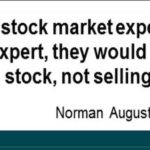Last evening, I was engaged in my usual TV channel hopping routine and landed up on a random stock market program. It was a normal show reviewing the day’s stock market events with a market “expert”. As I was getting ready to continue my channel hopping, the TV anchor asked our market “expert” a couple of questions. The questions initially made me chuckle and later made me think….
The questions posed to the “expert”:
- “Can you help our viewers with some ideas to play the market tomorrow?”
- “Which sectors are you bullish on and can you tell us a couple of sectors that we can bet on?
More than the routine answers that followed, it was the questions that made me think…
Did you observe the choice of words: “Play”, “Bet”?
Normally we use these words to frame sentences like:
- Let us play a game of tennis.
- Can we play a game of cards?
- I hope to bet on the winning horse in tomorrow’s race.
- I am thinking hard on which team I should bet
If you don’t want to take my word for it then have a look at what Google auto suggestions threw up:
Fig: Google auto suggestions for “How to Play”:

Taking a cue from the television show, let us now try making sentences on stock market investing:
- I want to play in the market tomorrow.
- I wish to bet on “abc”stock as I predict it to be the next multi-bagger.
Sounds jarring to the ears right? Yes, I made up the above sentences and another google search tells me that I am not way off the mark:
Fig: Google search results for “playing the market”

Next let us replace “play” and “bet” with “invest” and re-frame the above two sentences:
- I want to invest in the market tomorrow.
- I wish to invest on “abc” stock as I predict it to be the next multi-bagger.
Sounds music to the ears right? Suddenly the activity sounds meaningful. But the underlying fact remains that investing (playing the market) based on guess work and predictions is called speculation and is a fail-proof strategy for losing your money.
Where the successful investors (like Buffet, Lynch among others) of our times have all expressed their inability to predict the market movements, some of the pundits writing in the print media and appearing on television sound very confident of their predictions.
The CXO Advisory group published a fascinating study on market timing ability of equity market experts. They collected 6582 forecasts given publicly for the US market from 1998 to 2012. The average forecast accuracy % for a market expert came around only 47%.
The below charts from the same study speak a thousand words on the forecasting and market timing capabilities of the market experts
Fig: Cumulative accuracy across Forecasts

Fig: Individual Market Guru Accuracy Histogram

I don’t entirely blame the market “experts” here. When you have been bestowed with a “pundit” status; you are on national television and you are asked to make predictions, then it becomes extremely uncomfortable and difficult to say these three magic words “I don’t know”!!!
Then there are another set of experts who get stardom and huge following by making an outrageous / contrarian prediction not in line with conventional wisdom. Harvard Business Review published an insightful article on forecasting ability of the experts.
In this study, the researchers analyzed the experts’ quarterly forecast of interest rates and inflation which had been reported in the Wall Street Journal. They concluded that experts who made wild but correct predictions and got famous are on an average the worst predictors in the long run. Also, experts who made these contrarian bets were mostly plain lucky.
The television anchor’s choice of words is a mere reflection of the levels of speculation prevalent in our stock markets. It also speaks of the latent demand among viewers for such advice from the market “experts”.
American author Robert Collier eloquently said “Supply always comes on the heels of demand”. Hopefully when the demand for ideas to “bet” and to “play” the market dries up then the supply of free speculative ideas to gullible investors may also get reduced.
A small step in that direction would be for us to realize the fundamentally “speculative” nature of our stock markets. If you ever wonder why the television anchor chose to use “bet and “play” then William Sharpe, creator of the Sharpe ratio, has written a wonderful parable to help us understand this.
Read this 1976 classic and the next time you hear about playing the market, you will know what to do!
Click to Read
Parable of Money Managers
Relate Posts
Do you love Reading?
Check out the best books to read at the Superinvestors Bookshelf Let’s stay connected, Follow me on Twitter @Stocknladdr



